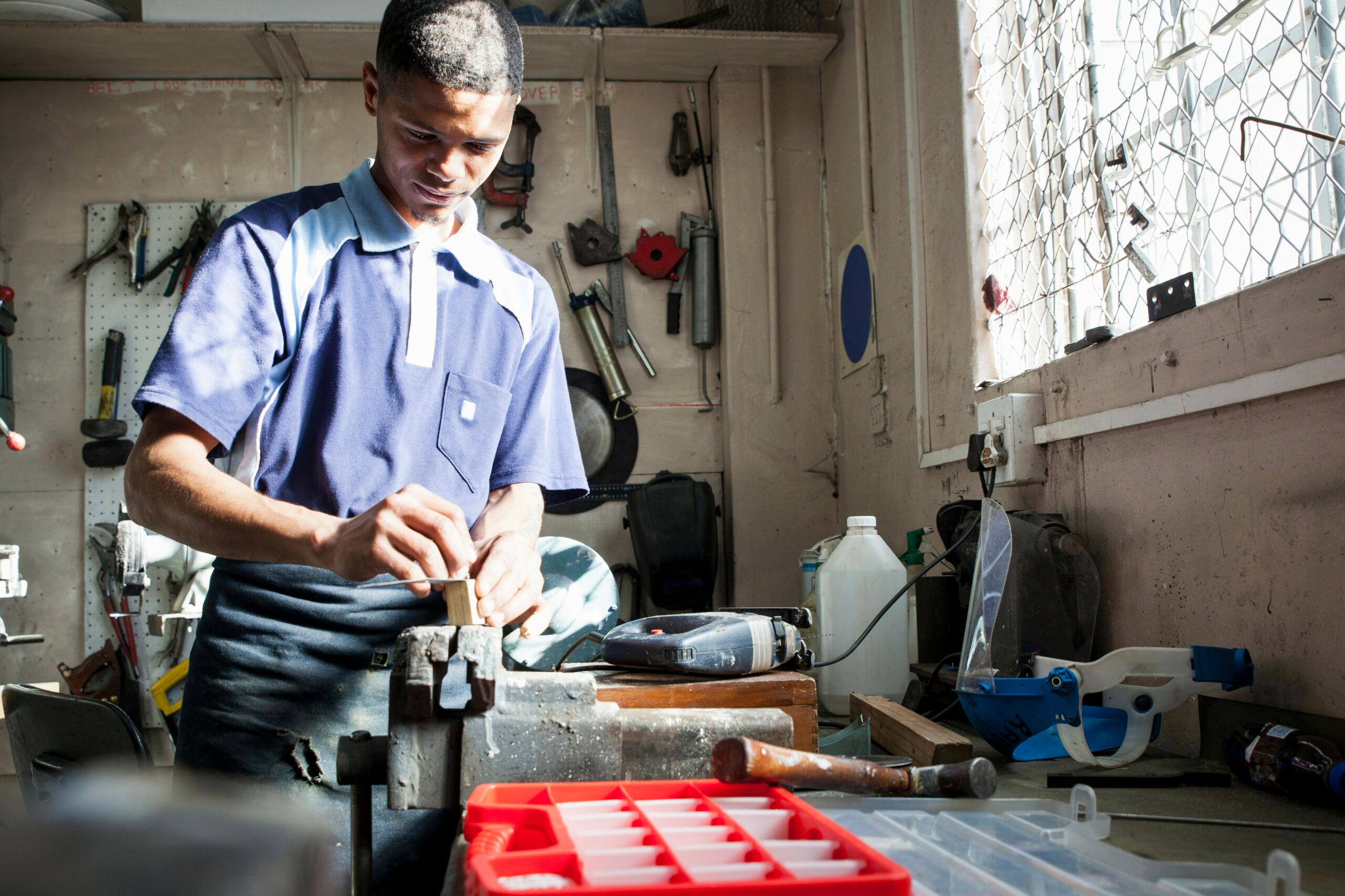Local Value, Global Impact: Skills Development for Sustainable Supply Chains
Resilient and sustainable supply chains need local production and skilled workers. UNIDO together with its global partners connect training with industry needs to support fair, green, and growing economies.
- May 07, 2025
- By Rona Aves

The world economy today is facing unprecedented challenges: climate change, resource scarcity, social inequality, and technological upheaval. In this complex landscape, building resilient, inclusive, and sustainable supply chains is no longer optional—it is imperative.
Supply chains must now deliver more than just efficiency. They must be designed to withstand global shocks, reduce environmental footprints, and generate shared prosperity. Yet, these goals are out of reach without two essential ingredients: sustainable local value addition and strategic skills development.
Local Value Addition: The Key to Sustainable Growth
Local value addition is a transformative strategy focused on strengthening domestic economies’ capacity to produce, refine, and process resources nearer to production sources.
Economies that invest in local value addition create more jobs, more knowledge, and capture a significantly larger portion of the global value chain. The implications go beyond economics. Becoming a value creator rather than a raw material supplier enables countries to redefine their role in global trade, reduce dependence on volatile commodity markets, and foster inclusive growth.
In global supply chains, local value addition helps strengthen resilience and reduce environmental impact through shorter transport distances and more efficient use of resources. Investing in value addition also deepens industrial linkages, stimulates innovation, and promotes more circular, regionally integrated economies.
Skills Development for Sustainable Supply Chains
Yet, achieving this transformation is not automatic. One of the biggest challenges to sustainable local value addition is the lack of appropriate skills.
The World Economic Forum assesses that nearly 9 out of 10 companies report facing skills shortages—and these shortages are expected to worsen over the next five years globally. According to a study conducted by global consulting firm McKinsey & Company, they estimated 39% of all employees will require reskilling by 2030, while closing the global skills gap could add up to $11.5 trillion to global GDP by 2028. Meanwhile, the International Labour Organisation’s 2022 report on the trends of youth and employment found that nearly 40% of the global youth labour force is either unemployed or living in poverty despite being employed. This highlights a profound misalignment between the skills young people possess and the types of jobs being created in modern economies.
Supply chains can only be resilient and sustainable when built on a foundation of skilled labour. A well-trained workforce ensures that local industries can meet quality standards, adopt new technologies, and comply with international regulations—factors that are increasingly essential in global trade. Skills development also plays a key role in enabling local value addition, with both processes mutually reinforcing each other. As local industries grow and diversify, they create new demands for specialized skills, which in turn drive the development of more targeted training and education initiatives. This creates a positive feedback loop: skills enable industrial upgrading, which in turn fuels demand for even more advanced skills. This dynamic interplay strengthens the broader economic ecosystem and supports sustainable growth. Moreover, it empowers individuals—especially youth and marginalized groups—by giving them access to meaningful employment opportunities within their own communities.
The 2022 World Bank report on the State of Global Learning Poverty emphasizes that individuals with access to training and educational programmes are 67% more likely to be skilled than their counterparts. This suggests that human capital investment in the form of skills development and education can significantly increase the likelihood of a labour force being competitive and can yield sustainable, long-term dividends.

Collaboration and the Path Forward
In order to bridge the skills gap and foster local value addition and sustainable supply chains, training programmes must be demand-driven, tailored to local industries, and inclusive—especially in closing gender and youth gaps. Public-private development partnerships (PPDP) are crucial in bridging this gap. The PPDP model unites governments, private companies, and development organizations to create targeted training programmes. Under UNIDO’s facilitation, these programmes are tailored to meet the specific needs of local industries, equipping workers with the necessary skills to support higher-value production, adopt new technologies, and operate sustainably.
PPDP projects leverage private sector competence while utilizing government infrastructure and facilities to develop human capital pipelines to sustain development in the most needed fields. Through this joint effort, resource-rich communities move away from exporting raw materials towards becoming competitive manufacturing hubs with space for sustainable production and innovation. PPDP projects also increase equity by providing space for women and marginalized groups, closing skills gaps while building more inclusive economies.

The future of sustainable industrial development depends on our ability to innovate and adapt to changing global demands. Addressing the skills gap and promoting responsible production practices are critical steps toward securing supply chains supporting both the green and digital transitions.
Be part of the change
UNIDO’s LKDF Forum 2025, titled “Skills Development and Local Value Addition: Ensuring Sustainable Growth in Global Supply Chains,” will bring together policymakers, industry leaders, development practitioners, and education experts to explore how skills development can drive inclusive industrialization, resilient supply chains, and sustainable local economies. By aligning training with industry needs, we can empower communities to move up the value chain and contribute meaningfully to the green and digital transitions.
Join us on 25 and 26 June in Gothenburg, Sweden—or online—and be part of the global movement to advance skills for sustainable industrial development. Reserve your spot today!
Attend virtually: https://events.teams.microsoft.com/event/e7966249-d29d-4010-9577be093c1cdf44@426a4931-ec5c-4fcb-9d10-3363ebdf9280
Attend in-person: https://forms.office.com/pages/responsepage.aspx?id=MUlqQlzsy0-dEDNj69-SgBAX_DEgK3VGsCAcwq9sUEhUMElCWkNCTktEMFM4UzFDMUtCVEpBRkRWOC4u&route=shorturl